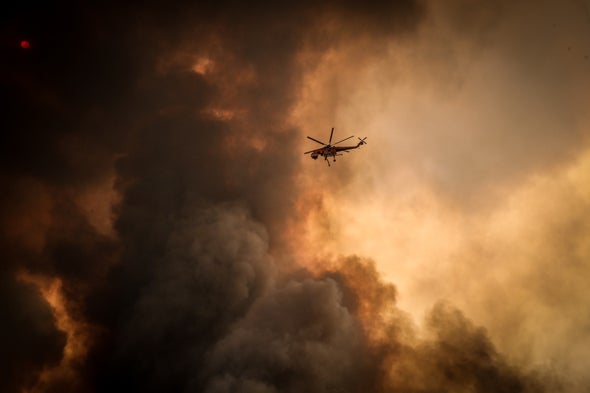Nerilie Abraman, an investigator at the ARC Center of Excellence for Climate Extremes and an associate professor at the Research School of Earth Sciences at the Australian National University, concludes that the catastrophic fires raging across the southern half of the continent are largely the result of rising temperatures.
 |
| Source: https://static.scientificamerican.com/blogs/cache/file/6E29B90E-E7D9-46AF-9DC660AAA45BF510_source.jpg?w=590&h=800&EFE3D1D5-0F10-44A8-A2A29309DDAF3513 |
The angry summer playing out in Australia right now was predictable. The scientific evidence is well known for how anthropogenic greenhouse gas emissions are causing long-term climate change and altering climate variability in ways that increase our fire risk. The role of climate change in the unprecedented fires gripping Australia is also well understood by our emergency services. Sadly, though, this summer has occurred against a backdrop in which the Australian government has argued, on the world stage, to scale back our greenhouse-gas-emissions-reduction targets. Our leaders are literally fiddling while the country burns.1
One of the factors driving this long-term loss of winter rainfall is the positive trend in the Southern Annular Mode (SAM). This change is causing the westerly winds that circle the Southern Ocean to shift southward toward Antarctica, causing rain-bearing winter cold fronts to pass south of the Australian continent. The role of anthropogenic climate change in driving this trend in the SAM is also clear in the science.The Bureau of Meteorology has produced a video to help understand one of Australia's key climate drivers, the Southern Annular Mode (SAM).
Ben Piven at Al Jazeera News wonders will youth climate activists see their pleas answered in 2020?
If a climate-driven "act of God" sets off a true financial crisis - with insurance firms unable to stay afloat after unprecedented wildfires and cyclones - political leaders could respond in kind.2
Mark Jaccard, energy economist and adviser to world leaders, known in global climate circles as a leading architect of British Columbia's successful climate struggle, wants to tell the world there is hope.
 |
| Storm surge |
He admits that in fossil fuel-producing areas of the world like Australia and Alberta, there are many who will remain impossible to sway.
"It is difficult to get a man to understand something when his salary depends on his not understanding it."3
The first step of Mark Jaccard's strategy is to put the immediate effort on two areas that mostly affect a country's domestic markets. Those two areas, energy production and transport — essentially power plants and cars and trucks — are responsible for the majority of most countries' greenhouse gas emissions.
 |
| Transition away from fossil fuel |
At the same time, that transition will lay foundations that will make later industrial decarbonization easier.
Because in the long run, getting carbon out of world's atmosphere cannot be completed by a few individuals doing good, it must instead be a project of people using politics to transform regional and national rules about carbon. Jaccard says those regions and countries will then combine to put carbon tariffs on the world's free riders, not a project for 2020.3
Jaccard recommends… donating… to a pro-climate group that can identify and support climate-sincere politicians and point a finger at the majority of those who are "faking it."
References
No comments:
Post a Comment